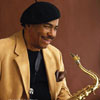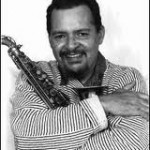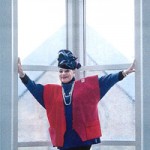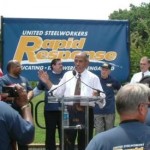Thelonious and the Keyboard Bugs
by Walter Bishop, Jr.
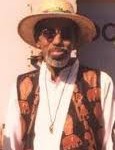
Picture if you may:
The scene was Harlem of an earlier day.
Bugs and roaches crawling up and down keyboards
The whites, the blacks,
In and out of the cracks.
Check the facts.
An incredible lot they were;
They had their own kingdom,
They had their own hierarchy,
They had their own God.
It was a centipede named Art –
Brother, he played piano with every part.
He became known as God.
The King was a mighty gnat named Cole.
He played and he sang like a merry old soul.
Then there was elegant Edward, the firefly –
A most illuminating creature.
“Sophisticated Ladies” was to become his feature.
And he’d go on to become the Duke
Of that wonderful land we know of as Ellingtonia.
Then there was Bouncin’ Bill from Red Bank,
The grasshopper.
He had this weird habit
Of jumpin’ up and down at one o’clock each night.
Now, he became known as the Count of Swing,
But you and I know he really was King.
Tad, the talented tadfly –
He would go on to rule Dameronia to “our delight”
Then there was Amazing Bud, the hornet.
He turned the whole thing around
With a machine-gun like sound.
He struck the keys magically
But would end up tragically
In a glass enclosure.
J.P. the honeybee –
In his day he was master, for none could play faster.
Eubie, the termite –
They say he used to eat up piano keys
Morning, noon and night.
And lest I forget –
Those lightening-fingered ladybugs
With names like
Hazel,
Dorothy,
And Mary Lou.
I want to tell you,
They could run up and down the keys with the best of them too.
So you might say
Thelonious learned from the boogie, the stride and the rag,
Then he proceeded to come out of his own personal bag.
But Thelonious had problems, you see,
Because he was a bit too deep
For the average creep.
And I don’t think all his friends could be trusted,
Because lo and behold, Thelonious got busted.
And dig the charges:
Thelonious assault on stock standards.
Melodious malpractice.
Diatonic distortions on boring ballads.
And add to that
Fornicating with the likes of
Liza,
Honeysuckle Rose,
And Sweet Georgia Brown.
How could they know he was just a gigolo.
Well, fortunately for Thelonious,
None of these chicks showed up to press charges.
‘Tis my belief
They dug the changes he put ’em through.
I know they were never the same!
So,
That slowed him down for awhile,
But he wasn’t about to change his style.
He merely went underground
And proceeded to perfect his sound.
And wouldn’t you know it –
Soon the scene became imbued
With the sound of “Monk’s Mood”.
And even the finks
Ordered their drinks
“Straight, No Chaser”.
I mean, from underground artiste,
Outwit the beast.
Become high priest.
Which reminds me:
In Shakespeare’s “Hamlet”
It was Polonious,
While counseling his son Laertes,
Who was about to embark on a trip to England –
The last thing he said to him was
“This above all things, my son,
To thine own self be true.”
In our lifetime, it would be Thelonious’s life style
Which was the embodiment of these words of wisdom.
A seer without peer.
A musical mutineer.
He would go on to commandeer
A new frontier.
And become known among nations
For his bold innovations.
What more can I say?
He loved to love us
And left us
The ‘evidence.”
Archives
- December 2025
- November 2025
- October 2025
- September 2025
- August 2025
- July 2025
- May 2025
- March 2025
- December 2024
- November 2024
- October 2024
- July 2024
- June 2024
- May 2024
- April 2024
- March 2024
- January 2024
- December 2023
- September 2023
- May 2023
- April 2023
- March 2023
- November 2022
- October 2022
- February 2022
- December 2021
- October 2021
- September 2021
- August 2021
- July 2021
- June 2021
- April 2021
- March 2021
- February 2021
- January 2021
- December 2020
- November 2020
- October 2020
- August 2020
- July 2020
- June 2020
- May 2020
- April 2020
- March 2020
- February 2020
- January 2020
- December 2019
- November 2019
- September 2019
- August 2019
- July 2019
- May 2019
- April 2019
- March 2019
- February 2019
- January 2019
- December 2018
- November 2018
- October 2018
- September 2018
- August 2018
- July 2018
- May 2018
- April 2018
- March 2018
- February 2018
- January 2018
- November 2017
- October 2017
- September 2017
- August 2017
- June 2017
- May 2017
- April 2017
- March 2017
- February 2017
- January 2017
- December 2016
- November 2016
- October 2016
- September 2016
- August 2016
- July 2016
- June 2016
- May 2016
- April 2016
- March 2016
- February 2016
- January 2016
- December 2015
- November 2015
- October 2015
- September 2015
- August 2015
- July 2015
- June 2015
- May 2015
- April 2015
- March 2015
- February 2015
- January 2015
- December 2014
- November 2014
- October 2014
- September 2014
- August 2014
- July 2014
- June 2014
- May 2014
- April 2014
- March 2014
- February 2014
- January 2014
- December 2013
- November 2013
- October 2013
- September 2013
- August 2013
- July 2013
- June 2013
- May 2013
- April 2013
- March 2013
- February 2013
- January 2013
- December 2012
- November 2012
- October 2012
- September 2012
- August 2012
- July 2012
- June 2012
- May 2012
- April 2012
- March 2012
- February 2012
- January 2012
- December 2011
- November 2011
- October 2011
- September 2011
- August 2011
- July 2011
- June 2011
- May 2011
- April 2011
- March 2011
- February 2011
- January 2011
- December 2010
- November 2010
- October 2010
- September 2010
- August 2010
- July 2010
- June 2010
- May 2010
- April 2010
- March 2010
- February 2010
- January 2010
- December 2009
- November 2009
- October 2009
- September 2009
- August 2009
- July 2009
- June 2009
- May 2009
- April 2009
- March 2009
- February 2009
- January 2009
- December 2008
- November 2008
- October 2008
- August 2008
- July 2008
- June 2008
- May 2008
- April 2008
- March 2008
- February 2008
- January 2008
- December 2007
- November 2007
- July 2007
Categories
- Ain't But a Few of Us (2)
- Artist's P.O.V. (32)
- Book Review (4)
- CD REVIEWS (1)
- Crate Digging (5)
- Events (2)
- General Discussion (541)
- Indy Record Company P.O.V. (4)
- Jazz Ed (2)
- NEA Jazz Masters (1)
- Playlists (27)
- Radio (3)
- Records (25)
- Release (1)
- Songs (2)
- SoundViews (1)
- Tech Side (1)
- That's What They Heard (13)
- The Audience (3)
- The Presenter's P.O.V. (15)
- The Tip (8)
- Video (1)
- Weston Chronicles (2)
- Wondering Aloud (2)
Blogroll

